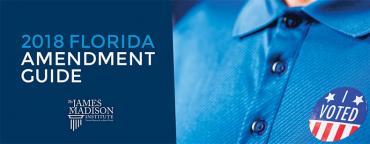
Ballot Language: Requires legislature to retain department of veterans’ affairs. Ensures election of sheriffs, property appraisers, supervisors of elections, tax collectors, and clerks of court in all counties; removes county charters’ ability to abolish, change term, transfer duties, or eliminate election of these offices. Changes annual legislative session commencement date in even-numbered years from March to January; removes legislature’s authorization to fix another date. Creates office of domestic security and counterterrorism within department of law enforcement.
How The Amendment Reached The Ballot: Constitution Revision Commission
What Your Vote Means: A Yes vote on this measure: (1) requires that the legislature provide for a Department of Veteran Affairs; (2) creates an Office of Domestic Security and Counter-Terrorism; (3) holds that the legislature meet on the second Tuesday of January in even-numbered years; and (4) prevents counties from abolishing certain offices—and requires elections for those offices. A No vote on this measure: (1) simply authorizes the legislature to provide for a Department of Veteran Affairs; (2) does not create an Office of Domestic Security and Counter-Terrorism; (3) keeps the current meeting dates of the legislature; and (4) refrains from adding language that prevents the abolition of certain offices.
Pro: This amendment addresses an issue that clearly relates to governance and rises to the level of address in the Florida Constitution. The legislature customarily meets from January to March in even-numbered years, so the amendment codifies the custom. The CRC bundled this legislative procedural effort with a desire to ensure proper care for our veterans. Currently, the Florida Constitution simply allows for a Department of Veteran Affairs. Amendment 10 would guarantee the existence of a Department of Veteran Affairs to meet the needs of veterans in the state – a growing constituency. Lastly, Amendment 10 creates some necessary uniformity among the posts and elections of the state’s 67 counties. Nearly all the counties in the state of Florida hold elections for county positions. These positions include tax collectors, property appraisers, supervisor of elections, sheriffs, and others. However, a small number of counties refuse to ensure statewide consistency. For example, Miami-Dade County is the only county in the state that appoints a police director rather than holding an election for a sheriff. Amendment 10 would foster consistency across the state and allow voters to elect officials in vital municipal positions.
Con: Those opposed to the measure would contend that by choosing to combine these initiatives, the CRC bundled relatively straightforward directives with a fairly contentious issue: county governance. Two counties, Broward and Volusia, filed suit and are asking to have Amendment 10 struck from the ballot. The counties allege that the amendment misleads voters and strips counties of their right to govern. Opponents complain that the Commission tied the issue of county governance to more popular or less contentious concepts like the codification of legislature meeting dates. Those opposed to the measure would claim that, although this amendment clearly relates to the governmental matters that have a place in the constitution, Amendment 10 overrides local governments who would otherwise determine their own constitutional offices. This mandate would require that counties hold certain offices and elections for those offices – those not already doing so would incur additional costs.
This amendment is reprinted with permission from the James Madison Institute's 2018 Florida Constitutional Amendment Guide. Click below to read more from our site!



